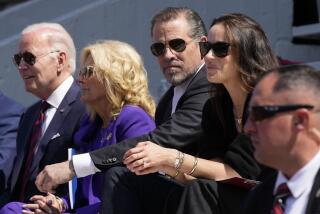U.S. Defends Decision to Settle Hutton Case
WASHINGTON â The Justice Department, in the most detailed defense yet of its decision not to prosecute individuals in the E. F. Hutton check-kiting probe, said Thursday that settling the case earlier this month averted a lengthy, legally uncertain trial that might have caused a financial panic.
In a letter to Sen. Thomas F. Eagleton (D-Mo.), Assistant Atty. Gen. Stephen S. Trott said that only two Hutton employees were âprimarily responsibleâ for the multibillion-dollar scheme, which defrauded about 400 banks, and that their prosecution would be âvery difficult.â
âOur career prosecutors opted for the numerous overwhelming benefits of the immediate solution,â Trott wrote, âand we find their judgment to be absolutely sound and above reproach.â
Congressional Criticism
But the explanation failed to stem persistent congressional charges that the Hutton settlement, worth more than $10 million, reveals a softness toward white-collar crime in the Justice Departmentâs top ranks.
Eagleton, who had sharply attacked the agreement in a letter to Atty. Gen. Edwin Meese III, said in a statement Thursday that the departmentâs defense âsimply wonât fly.â
In a related move, an aide to Sen. Charles McC. Mathias of Maryland, the second-ranking Republican on the Senate Judiciary Committee, said the panel would examine the Hutton plea bargain in hearings on white-collar crime later this summer. The House Judiciary Committee has scheduled similar hearings beginning Wednesday.
âThis isnât going to go away,â a Democratic Senate aide said.
âSubstantialâ Benefits Claimed
The six-page letter from Trott defended as âextraordinaryâ the Hutton settlement, which resolved charges that the huge brokerage firm had written billions of dollars in overdraft checks to banks, then invested the âfloatâ to earn millions more in illegal interest.
Hutton pleaded guilty to 2,000 counts of fraud, paid a $2-million fine and $750,000 in prosecution costs and agreed to repay the victimized banks at least $8 million for the interest they had lost.
While it is department policy to hold individuals rather than companies responsible for crimes, Trott stated, the benefits of the Hutton settlement âwere so substantial that they clearly warranted an exception to our policy.â
Prosecution of the two Hutton employees--both non-executive workers in the firmâs New York cash management offices--would have been âvery thornyâ because of recent Supreme Court rulings that have clouded the illegality of check-kiting, he wrote. Nor would a trial have assured repayment of all banks affected by the swindle.
Moreover, he wrote, a lengthy trial âhad the capacity to undercut public confidence in those banksâ that had suffered losses under the Hutton scheme.
âOne has only to look to the recent problems in Ohio and Maryland,â where privately insured savings and loan associations have suffered runs on deposits, âto see how fragile public confidence can beâ when bank losses are publicized, Trott wrote.
Eagleton rejected those explanations, saying he âstill cannot comprehend how, with 2,000 felony counts returned in this case, no one is guilty of a crime.â
Senate aides familiar with the case also questioned the letterâs excuses. Among questions left unanswered, they said, are why a fraud scheme that ended in 1982, leaving no mortally wounded banks, required immediate settlement to avoid a public panic.
They also questioned why Hutton agreed to such a huge cash settlement if even the conviction of two lower-level workers was uncertain at best.
âThe question that has to be raised is why it was so important to Hutton to avoid any individual prosecution,â one Senate aide asked. âThe question, really, is whatâs the trade-off?â
More to Read
Sign up for Essential California
The most important California stories and recommendations in your inbox every morning.
You may occasionally receive promotional content from the Los Angeles Times.










